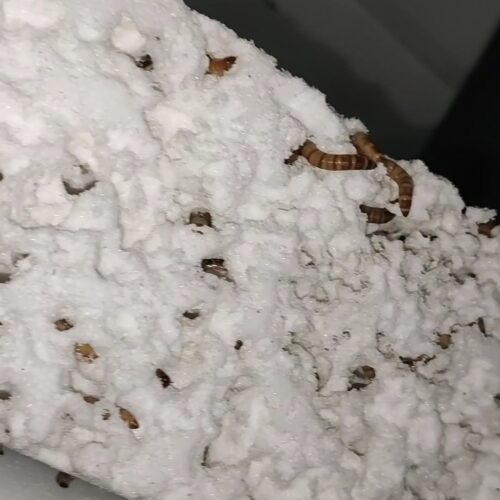
Superworms
Superworms is an art piece at the WIHH Gallery in Amsterdam that was created to showcase the results of our paper. Throughout the years scientists have discovered multiple bacteria and fungi species in landfills and insect guts that have evolved to degrade plastics back into their organic building blocks and utilize them as carbohydrates. Our research consisted off isolating and cataloging the species found in these insects using a plastic degradation selection media that we have developed ourselves. After the research was abandoned because of a lack of funding, the selection and growth of these bacteria resulted in me having a collection of plastic degradation optimized bacteria that are suited to live in certain insect guts.
One of these insects is the morioworm, also known as a superworm in the pet trade. I chose this organism because it is already known to contain P. aeruginosa which allows it to degrade styrofoam. It is also heavily farmed for the animal feed industry and their large size and mandibles make them a perfect candidate. Also, my bearded dragon happens to love them. Normal morioworms can degrade 1-2mg of polystyrene per worm per day. By developing a method to stably introduce these bacteria into the worm guts, the consumption rate is increased to 25mg of polystyrene per worm per day.
The worms are stripped of their original micro-biome, including the already plastic degrading species, and a new microbiota is created by colonizing their guts with the selected strains of P. aeruginosa, Acinetobacter, Exiguobacterium, Klebsiella, Serratia, Citrobacter, and Kosakonia. This new microbiota turns these morioworms into real superworms as they are now able to degrade plastics such as PS, PP and PPS at an unprecedented rate. Creating a natural solution to an unnatural problem.
I did this last part of the research and project completely independent and self funded and chose the social media way of presenting the power this has to offer. To do this on a large scale, you would rather study the enzymes that the bacteria are using and a lot of people that are way smarter than me are working on those problems. So I definitely won't be saving the world with this. But this way of showcasing research and scientific findings just is a lot more inspiring and reaches more people that learn something new.
I hope to have more of these exhibitions as they allowed me to reach, teach and force to think a lot of people so I'm currently looking for subsidies and grants that allow me to do so in Amsterdam.
Share this project!
With you support we can showcase our project to a larger audience and further improve upon the technology.
Help us rid the world of plastics!
We want to take this project to the next level by creating educational spaces where children and adults can watch and learn more about the way that nature learns to deal with plastic and how we can work together with nature on the mess that we created.
Support the project!
Bronze
- Receive updates on the project
- Access to the livestream to watch the worms
Silver
- Receive updates on the project
- Access to the livestream to watch the worms
Gold
- Receive updates on the project
- Access to the livestream to watch the worms
- Receive a jar of fertilizer (worm poop) that used to be plastic!
